Deflation Ahead for EU and European Manufacturing Supply Chains
Here's what I see happening in Europe, particularly Germany, and what manufacturers and European supply chains are facing. Includes charts and graphs.
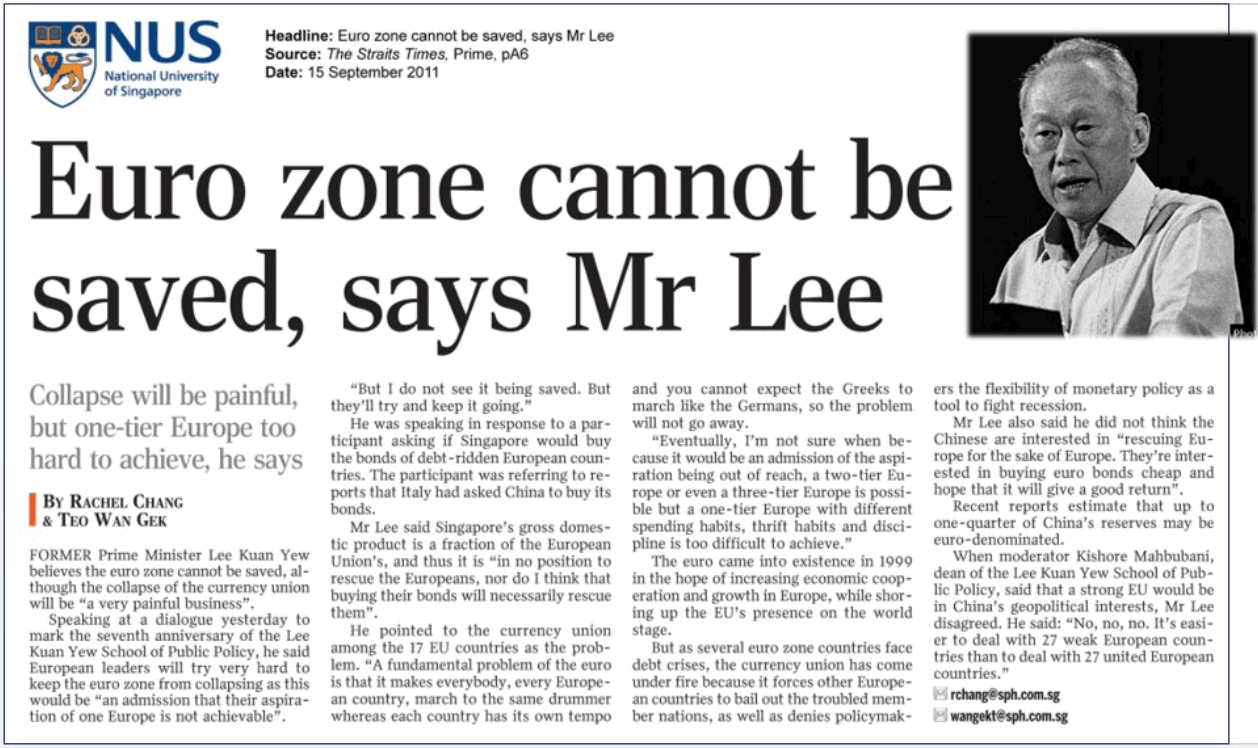
In 2011 Lee Kuan Yew, former first prime minister of Singapore (1959 to 1990), was quoted in The Straits Times, a Singaporean daily English-language, 21 years after Lee left office as first prime minister.
According to The Straits Times, in a discussion in 2011 that marked the seventh anniversary of the Lee Kuan Yew School of Public Policy, at National University of Singapore (NUS), Lee spoke about challenges facing a unified Europe and mentioned, in reference to European leaders, they will try all they can to prevent the euro zone from collapsing.
The newspaper quoted Lee stating this would be "an admission that their aspiration of one Europe is not achievable." Lee went on to say he did not think that "buying their bonds will necessarily rescue them."
Lee is recognized single-handedly for overseeing Singapore's transformation from a third-world nation into a developed country with a high-income market economy.
Lee addressed the European Union euro currency as a primary issue, saying, "A fundamental problem of the euro is that it makes every European country march to the same drummer whereas each country has its own tempo and you cannot expect the Greeks to march like the Germans, so the problem will not go away."
The euro currency is the same concern expressed by Jim Rogers, an American investor and former co-founder of the Quantum Fund and Soros Fund Management, in his book Adventure Capitalist published in 2004. Rogers views a nation's currency as a gauge for determining its true health.
I have factored various currency exchange rates for years when costing program landed costs and comparing competitor supply chains (vendors, suppliers and business models) for clients and I cannot agree more.
FOREX markets and where spreads apply in the supply chain can reveal a lot about supply chain strategy. For example, at what point does buffer inventory move from your supplier's books to your books? From which supplier locations do these transactions occur from?
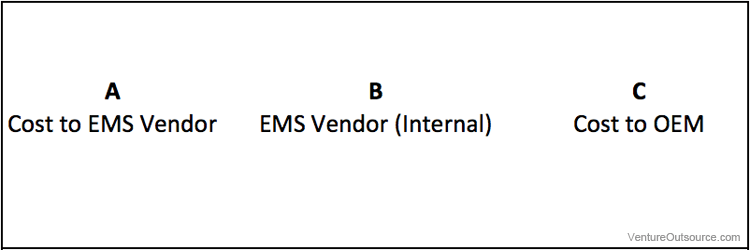
Meanwhile, Lee explained further when prompted, "Eventually, I'm not sure when because it would be an admission of the aspiration being out of reach, a two-tier Europe or even a three-tier Europe is possible but a one-tier Europe with different spending habits, thrift habits and discipline is too difficult to achieve."
As the discussion wrapped up, moderator Kishore Mahbubani, dean of the Lee Kuan Yew School of Public Policy, said to Lee, according to The Straits Times, "a strong EU would be in China's geopolitical interests", for which Lee is quoted as saying, "No, no, no. It's easier to deal with 27 weak countries than to deal with 27 united European countries."
What's next for Europe?
I don't know whether the EU will survive as a unified, economic block. What I do know is, currently, capital is leaving Europe for US markets as a safe haven as European manufacturing becomes more difficult to be profitable and manufacturer S,G&A and F,G&A input costs rise such as electricity and utilities, insurance, corporate tax and regulatory compliance, freight in and out...while demand declines.
The importance of manufacturing energy costs in industrial manufacturing cannot be emphasized enough.
An uninterrupted power supply is critical to the electronics manufacturing industry, for several reasons:
- Electronics manufacturing requires a significant amount of power, and a reliable power supply is necessary to keep production lines running smoothly. Interruptions in power supply can cause production lines to shut down, resulting in lost productivity, delays and further increased costs.
- Many electronic devices and components are sensitive to power fluctuations and power outages, and can be damaged or destroyed as a result. A reliable power supply helps to protect expensive equipment and prolongs its lifespan while also helping to reduce equipment maintenance costs.
- A reliable power supply is essential for maintaining consistent product quality. Power fluctuations and outages can affect the performance and functionality of electronic devices, and can lead to increases in the number, and frequency, of qualify defects and product failures.
- An unreliable power supply can cause customer dissatisfaction and damage the reputation of a manufacturing company’s brand. Customer complaints and negative feedback can lead to loss of business.
This article from BNN Bloomberg sums up what is happening in Europe, titled, "Germany is Unraveling Just When Europe Needs It Most".
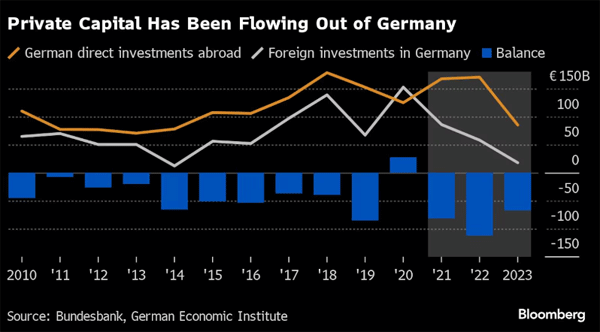
In talking with European manufacturers and other Western, and Asian, supply chain leaders with supply chain interests in Europe I see some cracks opening up with growing interest among OEM and EMS manufacturers in Europe seeking US-based production capacity and increased M&A activity as Europe's collective system for a market economy becomes smaller and more antiquated.
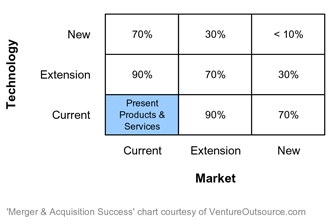
Take Germany, for example. Germany has been Europe's industrial engine for decades yet Germany's industrial production has been down-trending for almost eight years now. Germany energy-intensive industrial production is down 20% since 2022.
Europe's industrial base continues to falter per Bloomberg Economics charts here:
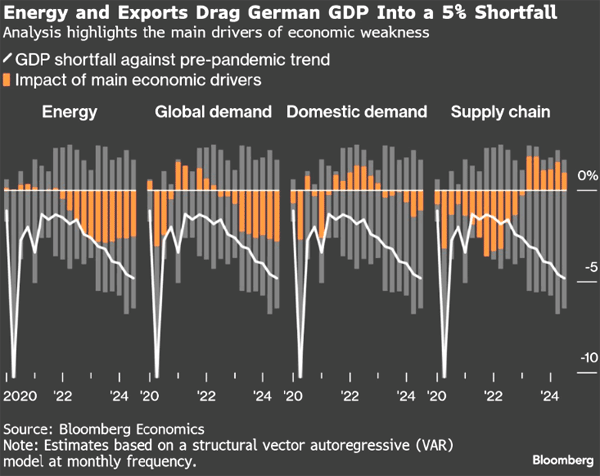
In reference to the cost of electricity in manufacturing in the above chart as it pertains to Germany, this next chart below, added to this article after publication on December 23, 2024 and courtesy of Holger Zschäpitz with German news publication WELT and author of 'Schulden ohne Sühne?' a book on states' addiction to debt, Zschäpitz posted on X @Schuldensuehner, stating, "the average wholesale electricity price for Christmas Eve is over 10 cents per kilowatt hour. Even more remarkable is the crazy volatility of prices. That is ruining flexible tariffs and Germany as an industrial location as a whole. There is no planning security whatsoever if you do not hedge the electricity price in the long term."
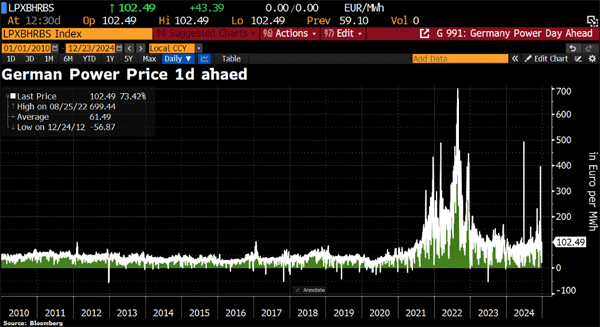
Also courtesy of Zschäpitz, this Statista data below, titled Stromaustauschsaldo Deutschlands in den Janren 1990 bix 2024 (in Terawattstunden) which translates to 'Germany's electricity exchange balance from 1990 to 2024 (in terawatt hours)'.
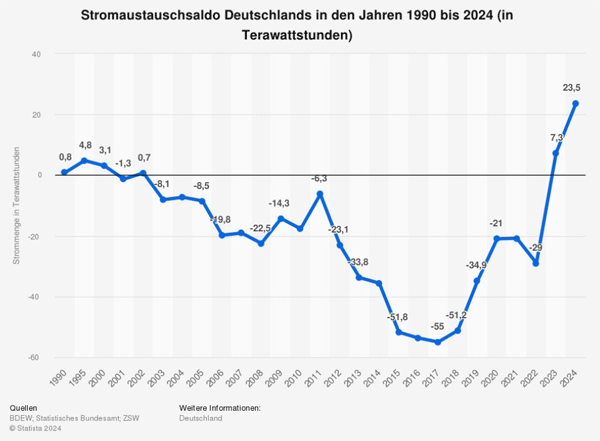
For the data above, Zschäpitz writes, "In 2024, Germany's electricity trade balance showed a net import of ~23.5 terawatt hours—meaning it imported ~24 terawatt hours more than it exported. Except for 2023, the last time this happened was in 2002. With Germany’s nuclear power plants now shut down, most of its imported electricity comes from France."
Additionally, from an investment banking report and sourced from the Federal Statistic Office of Germany, German manufacturing orders. Domestic demand from German consumers continues to drop as many German households are also facing deteriorating jobs markets.

Below, from Oxford Economics and Haver Analytics, trends in German industrial production, value added industry and employment.
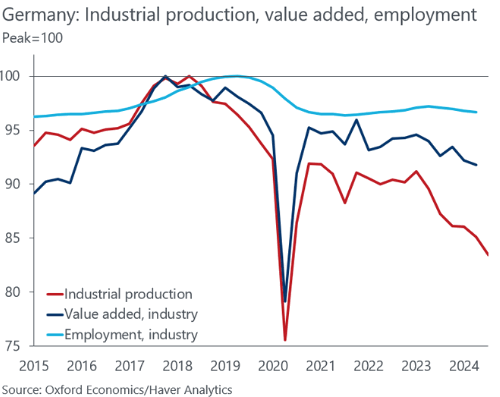
Many manufacturers nearly everywhere in many industries and verticals are fast-focusing on saving valuable cash to meet dynamic forecasts while keeping an eye on trying to grow income into softening demand accompanied by uncertainty. Part of this process involves layoffs and RIFs. Germany has been busy on this front due to EU industrial policy-making and poor German governance.

Despite the EU trying to help European manufacturers with macroeconomic financial programs specifically for European manufacturers and manufacturing communities, there is virtually no support in Europe for innovative companies.
Below, US and EU companies less than 50 years old with US$10 billion+ market cap (2023). Is innovation dead in the EU and greater Europe? European entrepreneurs with ideas and passion want environments where they can thrive.

Meanwhile, German composite PMI for employment with Euro area composite PMI, also for employment courtesy Frederik Ducrozet, head of macroeconomic research with Swiss private banking firm Pictet Wealth Management, on X @fwred.
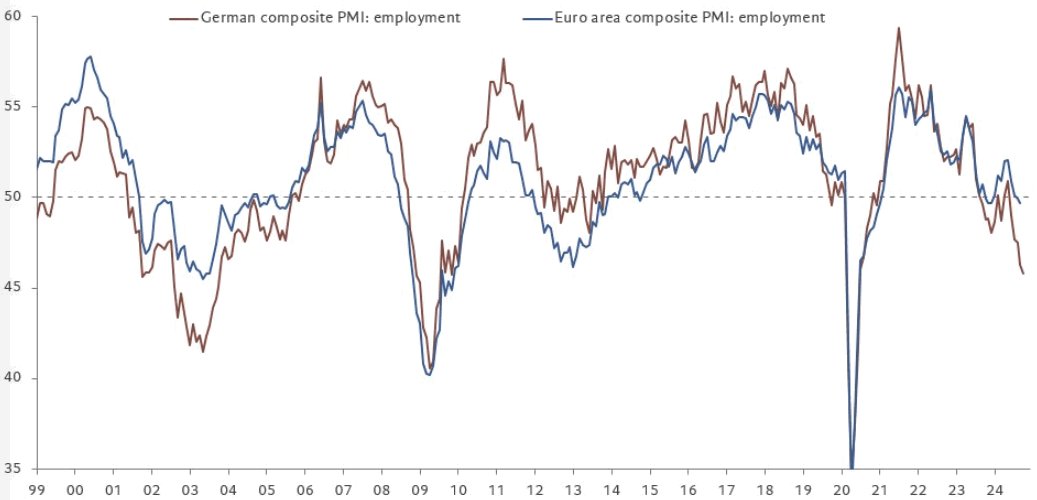
Noted below, German job cuts starting January 2024. The automotive industry in Germany is taking a hit with ZF, Continental, VW, Audi, Bosch, Tesla, Schaeffler, Ford, and Webasto each laying off employees according to the Initiative Neue Soziale Marktwirtschaft (INSM).
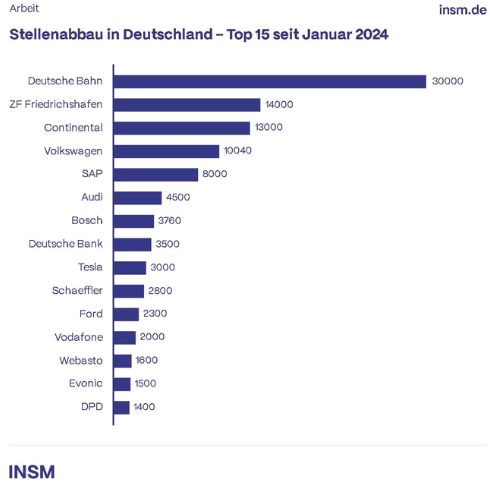
Chart below identifies percent mentions of German companies reporting a lack of orders in German manufacturing industry market verticals. The chart is from ifo, The Institute for Economic Research, a Munich-based research institution. Data was published November 11, 2023.
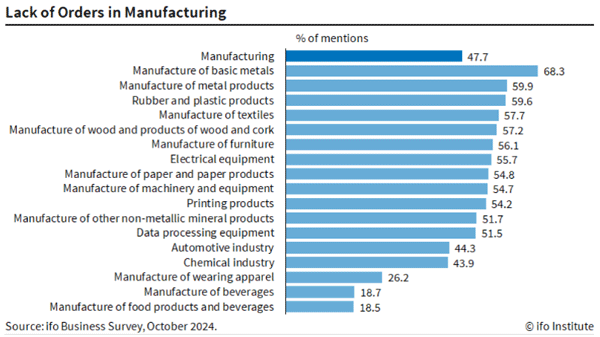
Concerning the chart above, ifo's Klaus Wohlrabe, Deputy Director of the ifo Center for Macroeconomics and Surveys and Head of Surveys, writes on the ifo website, "The German economy is being hit increasingly hard by the lack of orders."
Regarding the German electronics sector, Wohlrabe writes, "In manufacturing, nearly half of all companies (47.7%) reported a lack of orders. The core sectors, such as mechanical engineering, and the metal and electrical industries, are especially worried."
You can read more about the chart including details about the German services sector and other comments from Wohlrabe on the ifo website here.
Why is this important? Germany is 25% of the EU's economy. If Germany really is the economic canary in Europe's industrial mine I see potential risk for sovereign defaults in Germany and, possibly, other European nations.
As of today, I see high risk of deflation in Germany and some other European nations into 2025 and 2026.



